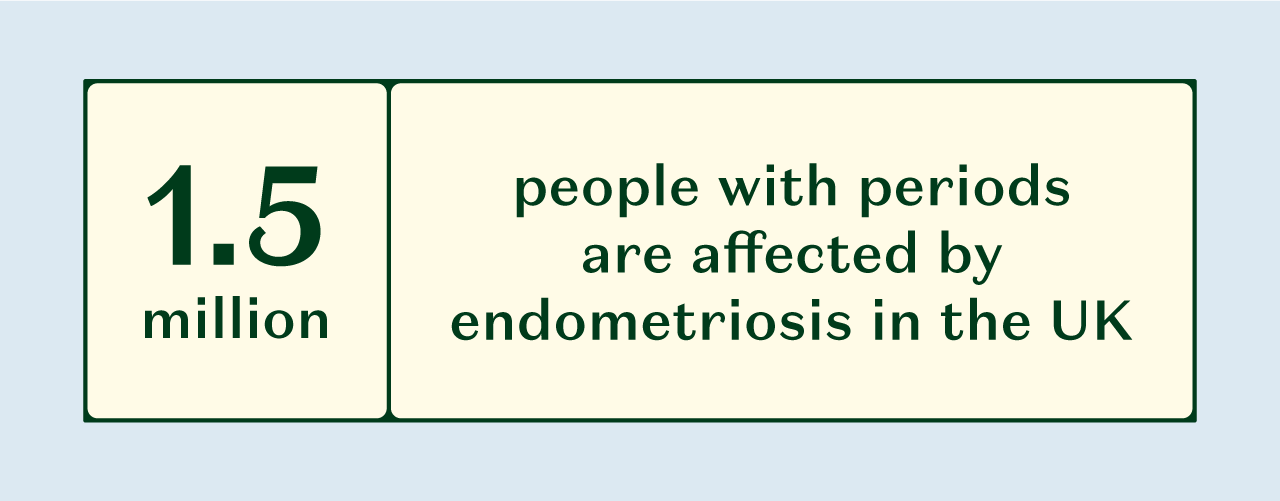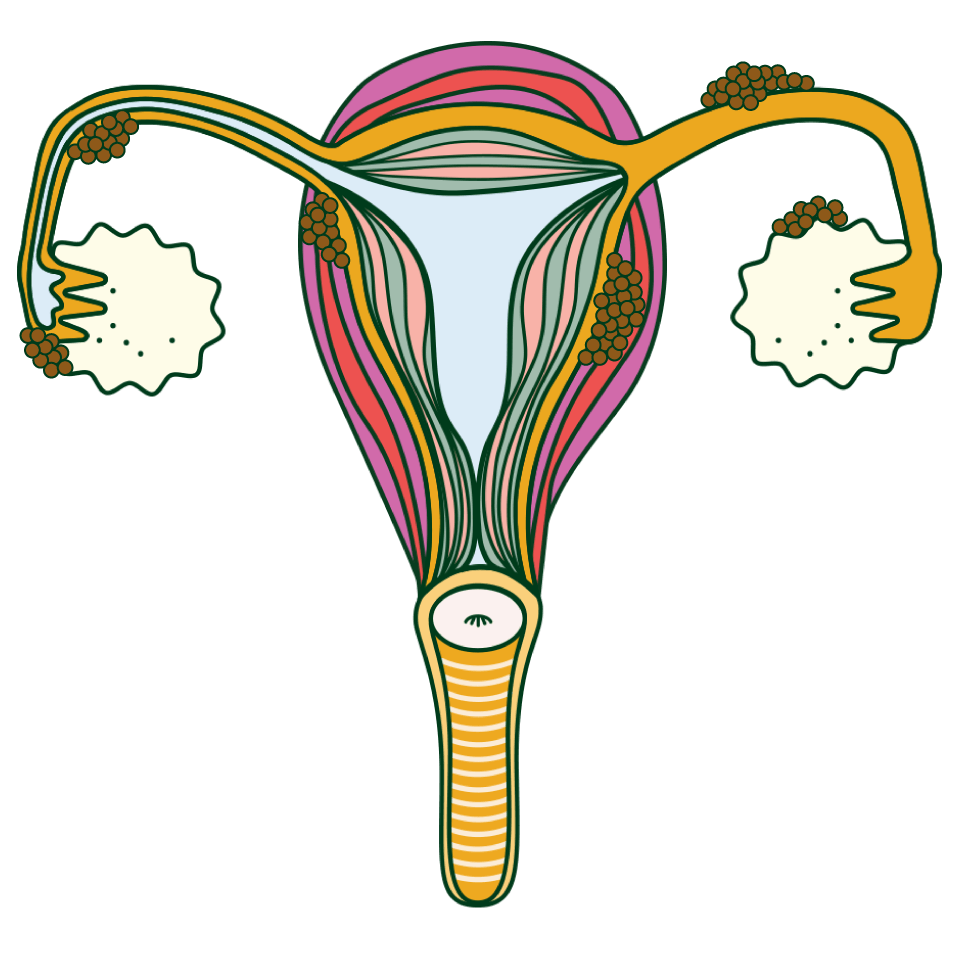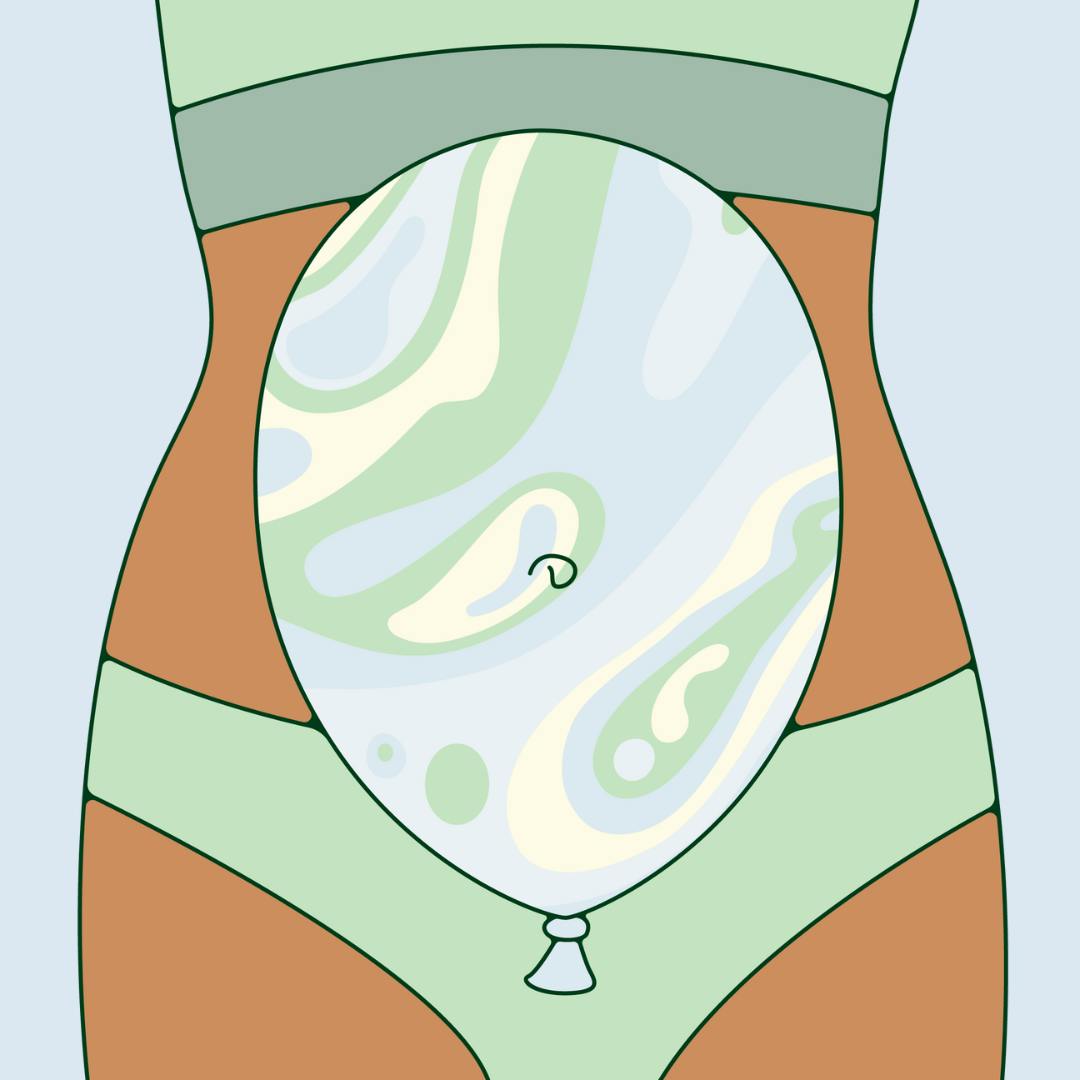Table of contents
1. Endometriosis is a chronic inflammatory condition
2. Even with an endometriosis diagnosis, symptoms and impact on day-to-day life vary widely.
3. You may notice your endo belly symptom occurring at specific times of your cycle.
Illustrated by Sabrina Bezerra, Erin Rommel & Ralitza Nikolova
Endometriosis causes a myriad of symptoms, well beyond the painful periods it is often noted for. Extreme bloating, commonly known as the “endo belly”, is one of the worst.
Endometriosis is a chronic inflammatory condition
where tissue similar to the lining of the uterus grows outside the uterus, causing chronic pain, GI issues and/or infertility. It’s a full-body disease, with endometrial like tissue having been found growing on every organ of the body, including the brain and lungs. At present, there is no cure for the illness, and treatments for the condition vary widely, with many misconceptions about the ways things like hormonal birth control or hysterectomies will contribute to a person’s symptom reduction.
Last year at a market with my partner, a woman stopped to ask me when I was expecting, if I knew whether I was having a boy or a girl? Besides the fact that is an intrusive question to ask anyone, little did the stranger know what unintended heartbreak she had caused, as I live with Endometriosis stage 4, which will have a huge impact on my fertility. Endometriosis affects around 1.5 million people who have periods in the UK at present. Dr Nitu Bajekal, experienced gynaecologist and women’s health expert, reminds us it takes on average 7 years to receive an endometriosis diagnosis, even though up to 70% of women being investigated for chronic pelvic pain, do in fact have endometriosis.

Even with an endometriosis diagnosis, symptoms and impact on day-to-day life vary widely.
For those living with later stages of endometriosis, the occurrence of ‘chocolate cysts’, is common. These cysts are made of endometrial tissue deposits that can adhere to the pelvic walls. The cysts can also be made of menstrual blood buildup, which often has a dark brown colour, which is where their name stems from. This type of cyst may be responsible for your endo belly, as they cause swelling from the pressure to the ovary, which will result in abdominal bloating.

You may notice your endo belly symptom occurring at specific times of your cycle.
Dr. Bajekal explains that although endometriosis is a chronic inflammatory condition, it is “prone to worsen with hormone fluctuations with people noticing worsening of symptoms (pain, discomfort, swollen belly) several days or even weeks in the lead up to their period”. This is why tracking your menstrual cycle, alongside your symptoms, may help alleviate some of the anxiety around your endo belly forming. The surprise element of an endo symptom can sometimes be the worst part. There are also small data studies showing those living with endometriosis are likely to have related gut issues, such as IBS and gut microbiome dysbiosis, which are also commonly associated with abdominal bloating. Dr. Bajekal advises those who are diagnosed with endometriosis and experiencing endo belly to try “adopting a whole food, plant predominant way of eating” to increase their fiber in order to feed our good gut bacteria to promote a healthy gut. This should be done alongside seeking the appropriate medical treatment to investigate any potential cysts and their potential removal through laparoscopic surgery.

Although the endo belly bloating can often resemble the large stomach of someone carrying a child, the different stages of endometriosis are all associated with infertility, making such assumptions both insensitive and invasive. Dr Bajekal says some new evidence suggests that endometriosis sufferers may have “alterations to egg quality and an impaired womb environment for implantation of the embryo”, which can make conceiving naturally more difficult. Chronic pain, particularly during intercourse, may be another reason why endo sufferers may have a harder time starting a family. Many endo patients seeking to have biological children, will use assisted conception methods such as IVF. These treatments are cost prohibitive, and almost never available through free healthcare systems. They are also extremely time-consuming, making them inaccessible to a lot of people. Although some people with endometriosis conceive without issues, it is a common experience to struggle with infertility. Alongside the chronic pain, fatigue, stomach swelling, and other endo symptoms, having children naturally can be complicated for the members of our community.
There are numerous reasons why someone is choosing to, or cannot have children. Much of the recent discussions have revolved around the climate crisis and rising cost of living. Those reasons should be respected, and so should the various illnesses, like endometriosis as barriers to natural conception. It is now time to stop asking people when, why, or why not they are going to have kids because it is personal and endlessly complex.






